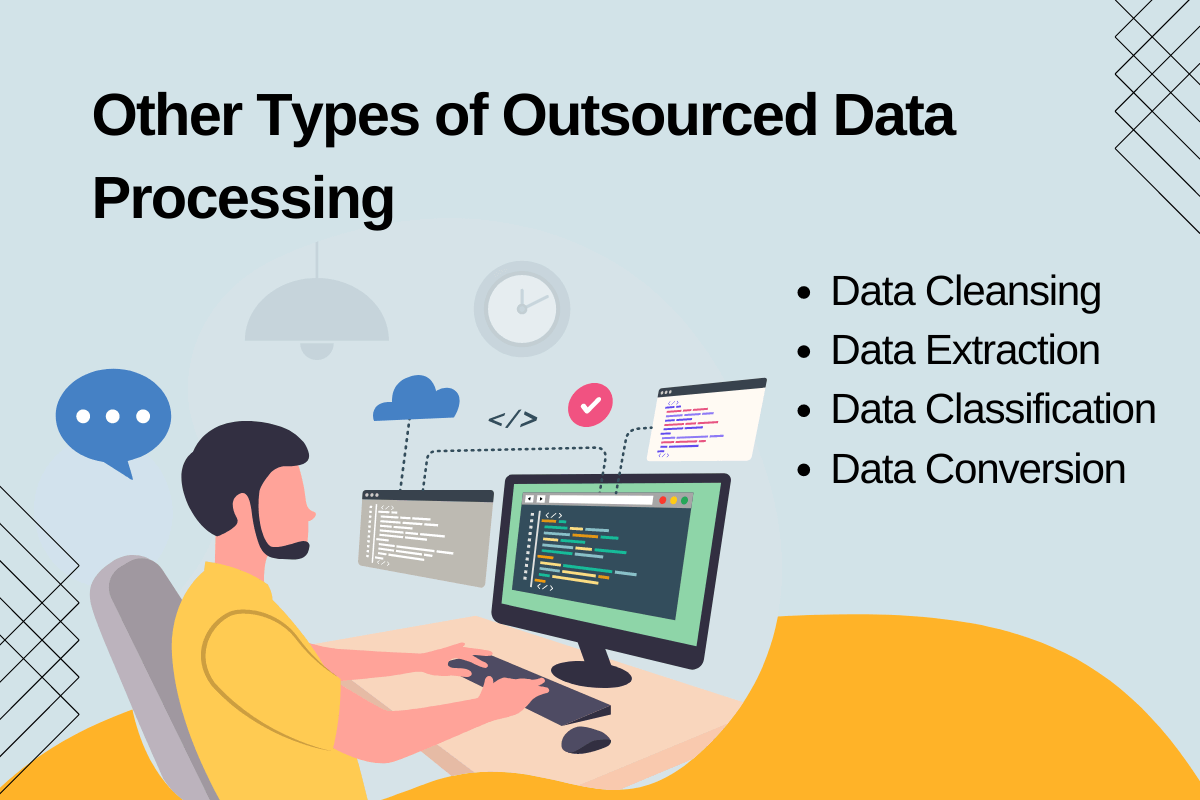Table of Contents
As companies embark on their digital transformation journey across diverse industries, it’s common to encounter data quality and scalability challenges. Given the vast volumes of data to manage, mishaps are almost inevitable.
Ensuring data accuracy and maintenance is vital for business growth, and many organizations have discovered that outsourcing is an effective solution.
This article serves as a comprehensive guide to outsourced data entry services. It delves into the types of data entry services available, industries that gain the most from outsourcing, and key aspects to consider when managing outsourced data entry.
Can Data Entry and Processing Be Outsourced?
Data entry and processing outsourcing is on the rise, with Technavio projecting a 6% market growth from 2020 to 2025. Data processing involves extracting pertinent information from diverse sources and converting it into a comprehensible format. It encompasses the retrieval, transformation, classification, and interpretation of data companies utilize for strategic planning and forecasting.
To enhance their success, some businesses find it necessary to engage the best data entry service providers who possess crucial data management skills and can adapt to ever-evolving encoding tools, all while minimizing recruitment expenses. A viable solution for this is outsourcing.
Typically, an outsourced data processing provider handles tasks such as:
Data entry and processing are popular candidates for outsourcing. According to Technavio, the outsourced data processing market projects a 6% growth from 2020 to 2025.
Data processing is extracting relevant information from various sources and turning it into an understandable format. Essentially, it’s retrieving, transforming, classifying, and interpreting information companies use to strategize, plan effectively, and forecast across the business.
To grow their success, some companies need to hire quality data processing experts who have the essential data management skills and can keep up with the ever-changing encoding tools, all while keeping recruitment costs down. An excellent solution to this is outsourcing.
An outsourced data processing provider typically manages the following tasks:
- Validation of data sets
- Knowing user requirements of data
- Converting raw data into machine-readable data
- Managing the collection, transformation, storage, and organization of data
Many data processing activities can be accomplished digitally, making them suitable for an offshore environment. So long as your company is offshore-ready, outsourced data processing remains straightforward and effective.
Types of Outsourced Data Entry and Processing

Many companies think that data entry is simple; you just need to enter information into a computer. Although that’s part of data entry and processing, there is much more to it. This section discusses the types of data entry outsourcing services companies can consider.
Online vs. Offline Data Entry
Online and offline data entry are the two main types of data entry services. The primary difference is the use of an internet connection for processing information.
The task is offline data entry when you don’t use an internet connection for the job. Some outsourced data processing providers send processed files to the client or move them to a folder. Offline data entry activities include converting information from a paper format to a digitized format and populating offline forms.
Online data entry is the act of entering information using an internet connection. Usually, online data entry is more extensive than its offline counterpart. Online data entry specialists must enter, edit, process, and update online databases.
Some main uses for online data entry include populating online forms, updating customer relationship management (CRM) systems, entering product information on ecommerce sites, tagging images, and annotating data online.
Other Types of Outsourced Data Processing
The different types of outsourced data processing services depend on the nature of the tasks you need to accomplish. The difficulty level also depends on the type of work. Data processing is a broad term that describes entering data from one file to another and analyzing and managing data.
The source of information that requires entering and processing can be in any format, from digital to hard copies. Some providers copy data from handwritten notes, while others convert audio and voice files into text through transcription. They also store the data in a digital database for future reference or use.
There are four major types of data processing tasks based on their nature: data cleansing, data extraction, data classification, and data conversion.
Data Cleansing
Data cleansing is organizing information kept in databases to ensure accuracy and timeliness. Data cleansing ensures proper organization and storage of information by eliminating duplicate and inaccurate information. Data cleansing is also called data scrubbing.
Tasks included in outsourced data cleansing:
- CRM update
- Database follow-up
- Researching information
- Removing duplicates
- Modifying information
- Correcting information
- Identifying and removing errors
Data Extraction
Data extraction is collecting and modifying information for future use or analysis. This procedure is useful for storing, analyzing, and filtering information, and generating reports based on that information. The primary focus of this type of outsourced data processing is to edit information in a manner that fits its purpose.
Tasks included in outsourced data extraction:
- Data capturing
- Entering claims
- Figures and accounting data entry
- Database creation
- Product or photo editing
Data Classification
Data classification is categorizing information based on certain characteristics and properties of the information. This procedure helps store information by classifying it for easy access later on. Data classification is useful for machine learning software and artificial intelligence (AI).
Tasks included in outsourced data classification:
- Classifying data
- Data tagging
- Data indexing
- Data annotation
- Product data entry
- Classifying business cards
Data Conversion
As the name suggests, data conversion transforms information from one file format to another. Data specialists can convert information from printed copies to digital files or from one digital format to another. There are two ways data operators convert information: manual or machine-assisted.
Tasks included in outsourced data conversion include:
- Audio transcription
- Capturing data from photo formats
- Data typing
- Copying data from handwritten notes
- Photo editing
Reasons Companies Outsource Data Entry and Processing

Companies outsource data processing for many reasons. At some point, every company has to perform data processing tasks. The challenge is that data processing is very time-consuming.
Data processing should not strain your primary business functions or burden your staff, who should focus on other critical activities. Companies can always build larger teams to manage data processing more quickly.
But building a dedicated team of data operators in-house is not always practical because of the higher project cost. Fortunately, back-office outsourcing services provide an opportunity to manage data processing efficiently and turn information into valuable assets.
Explore the reasons companies outsource data processing below.
Overcome the Scaling Challenges
Digitization is a continuous improvement rather than a final destination. Your data management and processing approach must be adaptable and scalable to support your growing business and meet the market’s changing demands.
Constantly recruiting new staff to manage your increasing data challenges is nearly impossible. It takes about eight months for a new hire to be fully onboarded and attain full productivity. Constantly hiring is also a risky and costly endeavor.
Insourcing simply lacks scalability. Moreover, data processing is a monotonous activity that increases the quantity of tedious work.
Companies that outsource data processing can delegate this tedious task to a third-party team. Outsourcing the function to a professional team offers accountability and scalability while mitigating quality control and communication issues.
Improve the Quality of Data
Data processing might seem like a low-skill activity. While that is true in some cases, data quality and consistency across all systems are critical. If you digitize legacy records to use information strategically, your efforts will fail if your records contain inconsistencies and errors.
Sectors such as finance and healthcare musts be extra careful because low-quality data can be highly detrimental to their businesses and clients. While your employees may have industry-specific skills to perform data entry, that may not be the most productive use of their time.
Outsourced data processing services have different levels of quality depending on the provider, so consider your options carefully.
Quickly Address Edge Cases
Many think that data processing is better off automated. But in automated data processing edge cases sometimes occur, and you need staff to moderate and address those situations.
While automation has reached a level where it can take over many routine data processing activities with little human intervention, it comes with an error rate. For instance, the error rate for optical character recognition varies from 5% to 20%.
Luckily, thanks to exception monitoring algorithms, automation itself can assist in identifying potential issues with data entry and processing. But human intervention to make manual corrections is still essential though it may add time to the task.
Companies that outsource data processing can use third-party resources, technology, and processes to promptly moderate edge cases.
Decrease Project Cycle Time
You should never rush data entry projects or compromise quality control, especially for sensitive transcriptions such as medical or legal records. But being timely is crucial, especially when you need the data for report generation.
Your employees already have enough work to do. Overworking them through loads of data processing tasks can easily lead to burnout and higher staff turnover, especially if data processing is not their primary role.
Outsourcing ensures data quality without sacrificing timeliness. A business process outsourcing (BPO) company has a long line of experience managing data processing work, making it capable of finishing the job faster than most in-house teams. It significantly reduces project cycle time and prevents backlogs.
When Does Outsourcing Data Processing Make the Most Sense?

Outsourced data processing services deliver the best value when your company has a massive amount of information waiting to be enriched, cleaned, transcribed, or digitized. This is often the case for many established businesses that deal with large quantities of data in legacy and printed format that needs to be converted into digital format.
Take a look below at some business sectors that benefit the most from outsourcing data processing:
Legal Sector
Outsourcing data processing makes sense for most companies in the legal sector. Data is critical for law professionals with large case files containing sometimes thousands of pages of documents.
Data processing operators can ease legal professionals’ workloads and enable them to concentrate on nurturing relationships with their clients and expanding their law practices. Additionally, converting archived records can help digitize and streamline case files and institutional history.
Legal data entry processors can take on tasks, including fact-checking and reviewing legal papers, filing invoices, indexing, and fixing document errors. Due to the nature of work, data processors for this sector need to be familiar with legal terminology.
Logistics
The logistics sector is highly complex, requiring coordination among various organizations, people, and facilities. It requires immense planning to transport products world wide and to oversea warehouses.
Accurate data processing is necessary to keep operations running smoothly. Companies that outsource data processing can hand off inventory management, order processing encoding, inventory report creation, and document fulfillment to third parties.
Insurance Providers
Another sector that benefits from outsourced data processing is the insurance industry. The insurance sector will reach $3,038.6 billion with a 5.5% CAGR by 2028.
As the insurance sector grows, the quantity of data it collects and processes also increases. Insurance companies must find an efficient solution for managing data processing to achieve success and ensure accuracy.
Insurance companies’ outsourced data processing services include claims processing and application, quoting, and proposals. Application data entry includes entering new policy amendments and renewal requests. Meanwhile, proposal and quoting data entry involves encoding premiums, commission summary tables, and coverage details.
Banking
As banks become increasingly digital and more clients rely on online banking tools, the finance sector must find a way to manage its financial transactions effectively and secure customer information.
Because financial institutions and banks handle private and sensitive information, they face severe consequences if they fail to manage data properly. For that reason, outsourcing finance data processing to a reliable and trustworthy provider makes sense for many banking institutions.
Once outsourced, the third-party data processors will be responsible for encoding and organizing client information such as financial transactions, banking details, and other related data.
Ecommerce
Ecommerce is another industry that benefits from outsourced data processing. With almost $5 trillion in global revenue, ecommerce is one of the fastest-growing industries.
As consumer demand increases, ecommerce stores must find ways to innovate and stay abreast of customer demands–and outsourcing data processing can help.
Outsourced data processing in ecommerce differs depending on the company. The general responsibility of third-party encoders for ecommerce includes:
- Managing the inventory database.
- Updating the online store and product data entry.
- Ensuring accurate shipping information.
- Creating detailed listings and descriptions.
Factors That Make Outsourced Data Entry and Processing Legitimate

Almost everything in today’s information landscape is digital. Retrieving, entering, storing, and processing data have never been easier. Although the advantages are apparent, these tasks also pose significant security risks.
When you outsource data processing, data security should be your top priority. Failing to secure data properly might lead to theft, leakage, etc.
The common security risks that companies should know about include:
- Risk of product information being misused or stolen: The threat of compromised sensitive data is a prominent cause of concern when outsourcing.
- Lack of data processing control: An unreliable data processing procedure can be detrimental for companies since it can lead to delays and backlogs.
- Strong chance of miscommunication: Language and cultural barriers exist, especially with offshore services. They can potentially lead to unintentional information leakage, which is damaging to a company’s reputation.
Outsourced data processing providers can overcome these challenges, thanks to recent technologies, innovations, and new smart strategies.
- Staff cannot use personal devices to handle sensitive data entry work.
- The company-provided devices and the hard disks and drives are encrypted. Storage is also protected with a password that only select employees can access.
- Equipment that companies provide has secure firewalls and VPNs to mitigate suspicious malware.
- Many outsourcing companies offer reliable internet connection broadbands for their remote employees.
- BPO companies use advanced tools such as customer relationship management (CRM) systems to keep track of customer issues.
- Outsourced data processing providers use collaboration tools such as Skype, Zoom, Slack, and more to streamline their processes.
A good tip for data entry outsourcing is selecting a provider with considerable experience and proven expertise in the field. Check out reviews from previous clients on social media and online forums to learn about their experience working with the BPO company.
Importance of Data Processing in Business

Data entry and processing are significant players in a business’ development and growth. Accurate data entry serves as the backbone of the business. Many strategic decisions are based on the information a business’ data provides that business.
Below are some reasons data entry and processing are crucial in a business:
- Data entry stores all relevant business data in an organized manner for future reference.
- Data quality affects employee efficiency, which affects the overall business operations. If a crucial piece of business information is missing, it can significantly affect other departments.
- The company’s efficiency can be determined by how systematic and organized their data is.
- The lack of accurate data entry can cost companies significant dollars and resources.
The Bottom Line
Outsourcing data processing saves employees from managing menial, repetitive work and provides a more accurate encoding process. One thing to remember is to outsource data processing carefully to guarantee success in your investment. Carefully assess your list of providers and the above factors to identify the BPO company that suits you best. If you want to delve deeper into this topic, we invite you to read our comprehensive article on the 20 Best Data Entry Service Providers.




